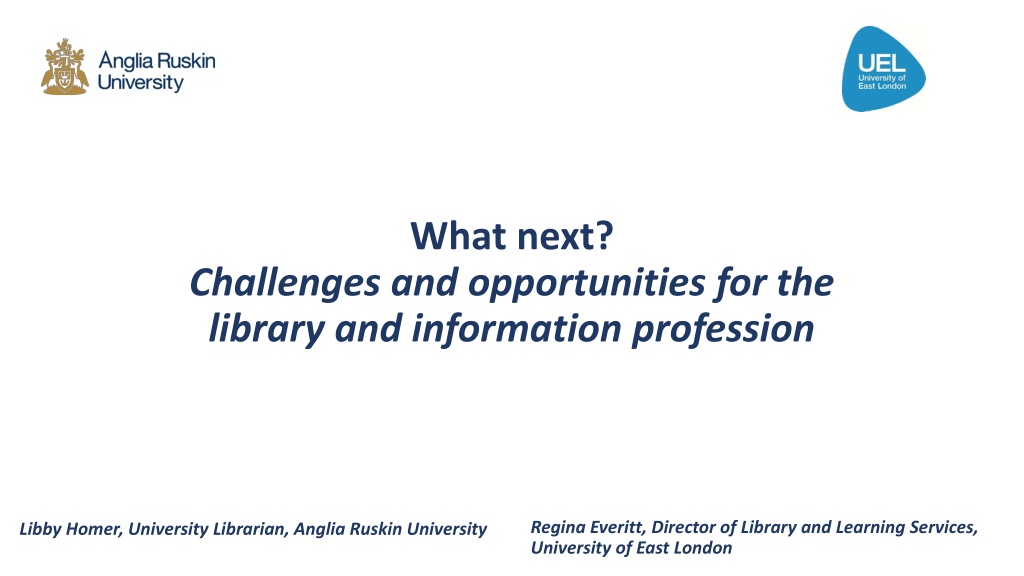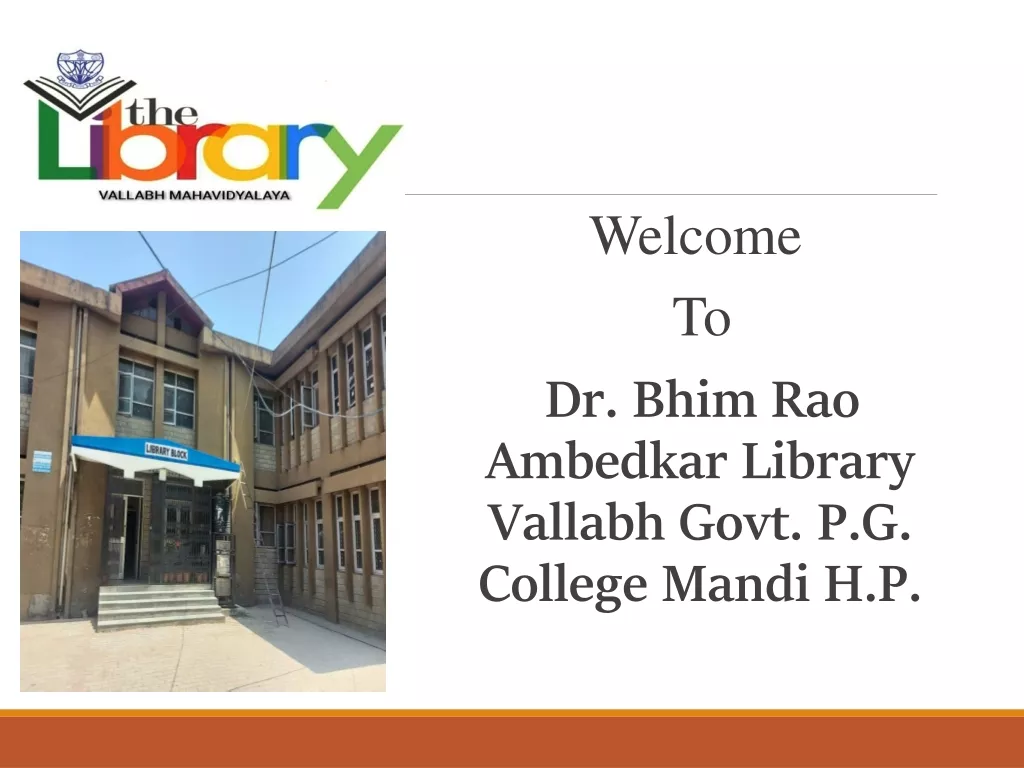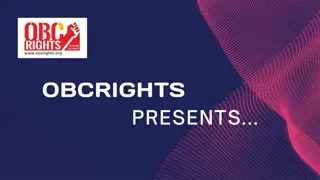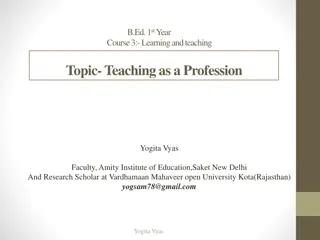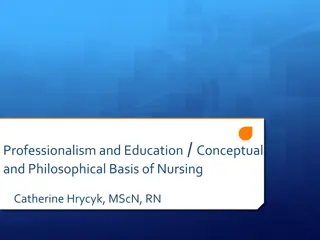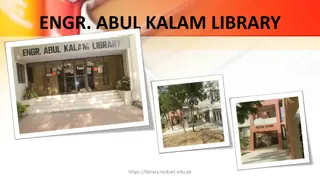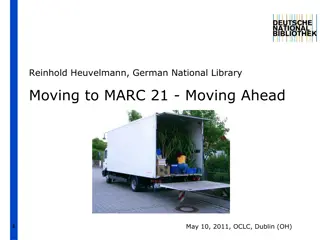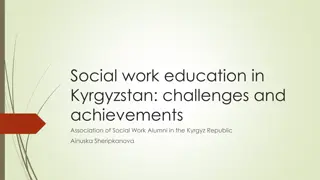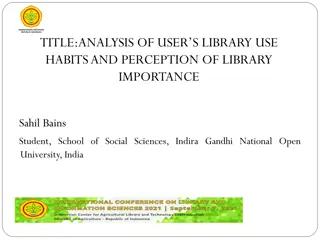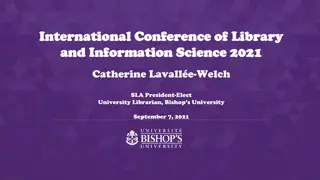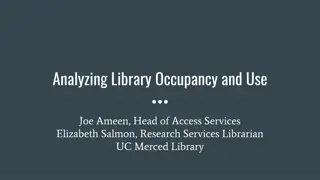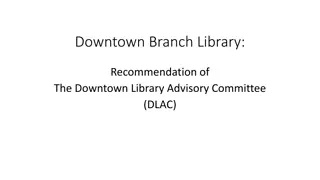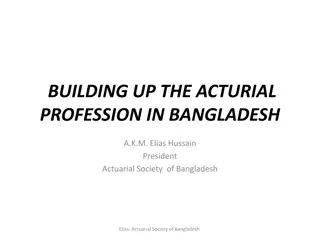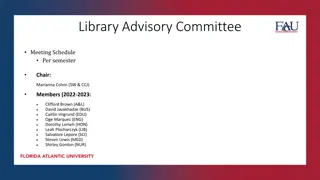library and information profession
This content discusses challenges and opportunities for the library and information profession, focusing on achieving diversity and supporting workforce development. It includes research findings on experiences of BAME staff, highlighting issues of racial discrimination at work. The content emphasizes the need for addressing diversity, talent pipeline, and adapting to changes in the profession.
Download Presentation

Please find below an Image/Link to download the presentation.
The content on the website is provided AS IS for your information and personal use only. It may not be sold, licensed, or shared on other websites without obtaining consent from the author.If you encounter any issues during the download, it is possible that the publisher has removed the file from their server.
You are allowed to download the files provided on this website for personal or commercial use, subject to the condition that they are used lawfully. All files are the property of their respective owners.
The content on the website is provided AS IS for your information and personal use only. It may not be sold, licensed, or shared on other websites without obtaining consent from the author.
E N D
Presentation Transcript
What next? Challenges and opportunities for the library and information profession Regina Everitt, Director of Library and Learning Services, University of East London Libby Homer, University Librarian, Anglia Ruskin University
What next? Challenges and opportunities for achieving diversity in the library and information profession Regina Everitt, Director of Library and Learning Services, University of East London Libby Homer, University Librarian, Anglia Ruskin University
SCONUL Workforce Development Group Programme on strategic workforce planning to support members in their own workforce planning, focusing on three key areas: Supporting members to address the lack of ethnic diversity across the library workforce, starting by listening to BAME staff members experiences of work The pipeline for new talent, exploring how to foster and support new entrants to the profession Developing the current work, particularly in adapting to fast-paced changes in the profession and the requirements of our home institutions
Research into BAME staff experience 69% female; 27% male; 4% other all regions represented but 58% from London; 17% from NW / NE / Yorkshire & Humber; 13% from SE / SW 52% with library related qualification; 42% with non-professional; 7% other What is your age-group? 30.00% 25.00% 20.00% 15.00% Responses 10.00% 5.00% 0.00% Under 25 26-35 36-45 46-55 56-65 66 or over
Research into BAME staff experience Have you ever experienced racial discrimination at work either from a co-worker or service user or both? 60.00% 50.00% 40.00% 30.00% 20.00% 10.00% 0.00% Yes No
Research into BAME staff experience If yes, did you report it? 70.00% 60.00% 50.00% 40.00% 30.00% 20.00% 10.00% 0.00% Yes No
Research into BAME staff experience If yes, was it resolved to your satisfaction? 90.00% 80.00% 70.00% 60.00% 50.00% 40.00% 30.00% 20.00% 10.00% 0.00% Yes No Don't know - Ongoing
On being monitored: I think it kind of puts a lot of pressure on you if there [are] very few ethnic minorities represented in the staff I think it kind of puts a lot of pressure on you if there [are] very few ethnic minorities represented in the staff because I feel that I have to try that bit harder .I feel that not only am I representing myself as a member of because I feel that I have to try that bit harder .I feel that not only am I representing myself as a member of staff and doing things to the best of my ability, I m also in some way representing how white people staff and doing things to the best of my ability, I m also in some way representing how white people are aregonna gonna see every see every[person of my race].... [person of my race].... So, you do feel that extra, you know, pressure of representing not So, you do feel that extra, you know, pressure of representing not just your profession but your race as well. (Focus group participant 4) just your profession but your race as well. (Focus group participant 4) .because I talk a lot about being BAME quite a lot and issues in librarianship and ask questions about it, I think .because I talk a lot about being BAME quite a lot and issues in librarianship and ask questions about it, I think that everything that everythingthat I do is closely monitored .I was asked to speak on a Panel by the SU about the BAME that I do is closely monitored .I was asked to speak on a Panel by the SU about the BAME experience in higher education and experience in higher education and the Deputy Director of the library just turned up and sat in the front row and the Deputy Director of the library just turned up and sat in the front row and watched me speak and when I finished she watched me speak and when I finished she left .I m definitely being watched in what I say. (Interviewee C) left .I m definitely being watched in what I say. (Interviewee C)
On workplace racism: I have had instances with colleagues who keep getting my name wrong and I don t think my first name is that difficult. Maybe I have had instances with colleagues who keep getting my name wrong and I don t think my first name is that difficult. Maybe it it is some sort of unconscious bias. I have people make comments about the fact that you know, I m vegetarian and it s because is some sort of unconscious bias. I have people make comments about the fact that you know, I m vegetarian and it s because I m a Hindu. I had a colleague who on multiple occasions said is it okay if I talk about meat in front you. And then I ve ha I m a Hindu. I had a colleague who on multiple occasions said is it okay if I talk about meat in front you. And then I ve had a supervisor in a previous job that during Ramadan she just turned around and said why aren t you fasting and made an supervisor in a previous job that during Ramadan she just turned around and said why aren t you fasting and made an assumption that I was Muslim. And then I had to say I m not. And then she said oh well what assumption that I was Muslim. And then I had to say I m not. And then she said oh well whatare you phrasing of it just quite confrontational and abrupt. phrasing of it just quite confrontational and abrupt. (Interviewee K) (Interviewee K) d a are you then. And it was just the then. And it was just the You have, you may have a sense of the fact that somebody is not treating you or treating someone else in a way that they You have, you may have a sense of the fact that somebody is not treating you or treating someone else in a way that they ought to or that they re not giving people perhaps the opportunity that they ought to give them. But it s often at times diff ought to or that they re not giving people perhaps the opportunity that they ought to give them. But it s often at times difficu to pin that, that is exactly what is happening and to prove it." to pin that, that is exactly what is happening and to prove it." icult lt
On union support: The unions, unions are helping you to do it yourself .before you were the underdog and you felt you had a bigger The unions, unions are helping you to do it yourself .before you were the underdog and you felt you had a bigger voice. voice. Unions aren t doing that any more. Unions aren t doing that any more.They re now trying to allow you to be They re now trying to allow you to be your behind you but they will never be in front of you anymore. behind you but they will never be in front of you anymore. So people certainly will not stick your neck out. (Focus group groupparticipant participant3) 3) yourself self- -advocate. So they will then perhaps advocate. So they will then perhaps be be So people certainly will not stick your neck out. (Focus On promotion: So it was a bit disappointing, felt I was always being overlooked because So it was a bit disappointing, felt I was always being overlooked because of this idea of bringing in fresh people. All cases of senior positions being filled were by white men. (Interviewee I) senior positions being filled were by white men. (Interviewee I) of this idea of bringing in fresh people. All cases of At some restructuring meetings UNISON representatives who were running these meetings said they had evidence they were At some restructuring meetings UNISON representatives who were running these meetings said they had evidence they were beginning to gather evidence about the fact that throughout that beginning to gather evidence about the fact that throughout thatrestructure and and minority minoritymembers of staff leaving and the members of staff members of staff leaving and the members of staffthat N) N) restructurethere were larger numbers of ethnic there were larger numbers of ethnic thatwhere where being beingpromoted promotedtended tendedto be white. (Interviewee to be white. (Interviewee
Provocations Where is this issue in your institution priorities? Where is the BAME talent within your service? Where is your pipeline for BAME talent and how do you tap into it? How can your HR processes enable you to recruit more diverse talent? How do you develop and embed a culture that challenges perceptions that unfairly disadvantage BAME talent?
Your action plan <action 1> <action 2> <action 3> <action 4> <action 5> Review on 8 May 2020 or next M25 conference
From participants to senior managers Make diversity a strategic priority Educate yourself Create more opportunities for progression Seek HR advice on EDI issues Monitor workforce diversity to provide a baseline Consider a BAME mentorship programme
Questions and further discussion
